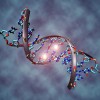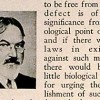Who’s My Other Mommy?
![]() Fraternal Rhesus Macaque twins, Mito and Tracker, have two different DNA mommies: their mother’s chromosomal DNA was injected into enucleated egg cells belonging to another Rhesus monkey female prior to fertilization. The eggs were fertilized, in vitro, with donor sperm and implanted in yet another female who carried the healthy twins to term.
Fraternal Rhesus Macaque twins, Mito and Tracker, have two different DNA mommies: their mother’s chromosomal DNA was injected into enucleated egg cells belonging to another Rhesus monkey female prior to fertilization. The eggs were fertilized, in vitro, with donor sperm and implanted in yet another female who carried the healthy twins to term.
The nucleus, where chromosomal DNA is stored and protected, is not the only source of DNA in a mammalian cell. Mitochondria have their own 16,569 bp genomes encoding 37 genes involved in the production of biological energy, ATP. Mutations in these genes have been linked with human diseases including diabetes, cancer, infertility, and neurodegeneration. Women who carry a mixture of normal and mutated mitochondrial DNA, a condition called heteroplasmy, may be physiologically healthy but risk having seriously ill children. The birth of Mito and Tracker, at the Oregon Health and Science University (OHSU), suggests that there may be a way for heteroplasmic women to bear healthy, (mostly) biological children.
When one female’s chromosomal DNA is transferred into another’s enucleated egg cell, the first female’s mitochondrial genome is replaced. The resulting child features mom’s and dad’s chromosomal DNA, but also carries a donor female’s mitochondrial DNA. Should the DNA transfer technique work in human cells, “who’s my other mommy” could be a question for the courts.
| Print article | This entry was posted by Tedi Setton on October 26, 2009 at 6:08 pm, and is filed under DNA Interactive. Follow any responses to this post through RSS 2.0. You can skip to the end and leave a response. Pinging is currently not allowed. |


